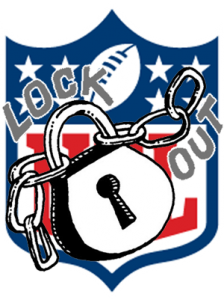NFL: Owners and Players Settle on a New Collective Bargaining Agreement
 After months of intense negotiating, the NFL Lockout came to a close late this July. Team owners unanimously voted, with the Oakland Raiders abstaining, to ratify the National Football League Players Association’s (NFLPA) latest collective bargaining agreement (CBA) proposal.
After months of intense negotiating, the NFL Lockout came to a close late this July. Team owners unanimously voted, with the Oakland Raiders abstaining, to ratify the National Football League Players Association’s (NFLPA) latest collective bargaining agreement (CBA) proposal.
This ended an impasse that had officially begun on March 12, 2011, just weeks after the previous collective bargaining agreement expired. In a collective bargaining situation, an employer uses a lockout just as employees use strikes. During a lockout, owners prevent players from practicing and playing in order to coerce players to agree to certain employment terms. Similarly, during a strike, players refuse to work in order to force owners to agree to their terms.
Throughout its history, the NFLPA has played different roles in player advocacy. At times, the NFLPA acted as a professional association and promoted free agency among players. During other times and recently, players authorized the NFLPA to act as a union and bargain on their behalf. Notably, the NFLPA has engaged in several strikes since its creation in 1956.
The current CBA is a 10 year deal and involves notable changes in how the league operates. First of all, a wage scale will limit pay for newly signed rookies, which should effectively reduce the length of their initial contracts. Many players welcome this and feel that more experienced players should be making the big bucks, not the incoming rookies. Also, there will be fewer mandatory workouts and practices during the football season. Less training is expected to result in a lower number of injuries.
Some of the final items agreed upon were guidelines for on-field misconduct. Under the new CBA, players seem to have greater protection when it comes to penalties and fines. Now, the league must bring issues before the NFLPA before suspending players or fining them over $50,000. Players also have the right to appeal a fine that is greater than a certain percentage of their salary. Finally, the CBA provides for the possibility of human growth hormone testing in players so long as the union agrees to an acceptable method of testing. Human growth hormone testing has been a controversial issue in professional sports, so whether the two sides will ever reach an agreement on the issue is up in the air. One thing is for certain though: football is back – at least for the next 10 years.
The Yau Law Firm now has a licensed sports agent and Sports Law attorney to represent athletes considering a move to the pros. If you’re thinking about a career in professional sports, it is important to consult with an athletic agent before signing with a team.
Leave a Reply